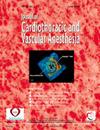Quo Vadis, ECMO? Multidisciplinary Hybrid Extra Corporeal Membrane Oxygenation Rounds During the COVID-19 Pandemic
IF 2.3
4区 医学
Q2 ANESTHESIOLOGY
Journal of cardiothoracic and vascular anesthesia
Pub Date : 2024-08-02
DOI:10.1053/j.jvca.2024.07.049
引用次数: 0
Abstract
The complex care of patients on extracorporeal membrane oxygenation (ECMO) requires a high level of collaboration between multiple medical specialties and allied health professionals. Effective and timely communication between team members is imperative in ensuring patient safety. The COVID-19 pandemic posed unique challenges in the care of patients on ECMO. Communication between team members was complicated by social distancing recommendations, increased patient volume, and staff turnover. In this article, we describe a hybrid approach to rounds that allowed team members to attend virtually or in-person to improve team communication. Weekly hybrid ECMO rounds were held to discuss patient cases and work collectively to establish patient centered goals for the following week. Critical care and surgical consultants, registered nurse ECMO specialists, RNs, perfusionists, respiratory therapists, physical and occupational therapists, pharmacists, ethics committee members, and patient family members were invited to attend hybrid ECMO rounds. After eight months of rounds, medical care team members were asked to provide feedback regarding the rounds format, strengths, and weaknesses. The most frequently identified strengths were improved multidisciplinary communication and continuity of care. This article demonstrates that hybrid virtual and in-person patient rounds are a feasible way for ECMO programs to improve team communication and overall patient care.
ECMO 何去何从?COVID-19 大流行期间的多学科混合式体外膜肺氧合循环。
体外膜肺氧合(ECMO)患者的护理工作十分复杂,需要多个医疗专科和专职医疗人员之间的高度协作。团队成员之间及时有效的沟通对于确保患者安全至关重要。COVID-19 大流行给 ECMO 患者的护理带来了独特的挑战。团队成员之间的沟通因社会疏远建议、患者数量增加和人员流动而变得复杂。在本文中,我们介绍了一种混合查房方法,允许团队成员以虚拟或面对面的方式参加,以改善团队沟通。每周举行一次混合 ECMO 查房,讨论患者病例,共同制定下周以患者为中心的目标。重症监护和外科顾问、注册护士 ECMO 专家、护士、灌注师、呼吸治疗师、物理和职业治疗师、药剂师、伦理委员会成员和患者家属应邀参加混合 ECMO 查房。查房八个月后,医疗团队成员被要求就查房形式、优点和缺点提供反馈意见。最常被指出的优点是改善了多学科沟通和护理的连续性。这篇文章表明,虚拟和面对面的混合患者查房是 ECMO 项目改善团队沟通和整体患者护理的可行方法。
本文章由计算机程序翻译,如有差异,请以英文原文为准。
求助全文
约1分钟内获得全文
求助全文
来源期刊
CiteScore
4.80
自引率
17.90%
发文量
606
审稿时长
37 days
期刊介绍:
The Journal of Cardiothoracic and Vascular Anesthesia is primarily aimed at anesthesiologists who deal with patients undergoing cardiac, thoracic or vascular surgical procedures. JCVA features a multidisciplinary approach, with contributions from cardiac, vascular and thoracic surgeons, cardiologists, and other related specialists. Emphasis is placed on rapid publication of clinically relevant material.

 求助内容:
求助内容: 应助结果提醒方式:
应助结果提醒方式:


